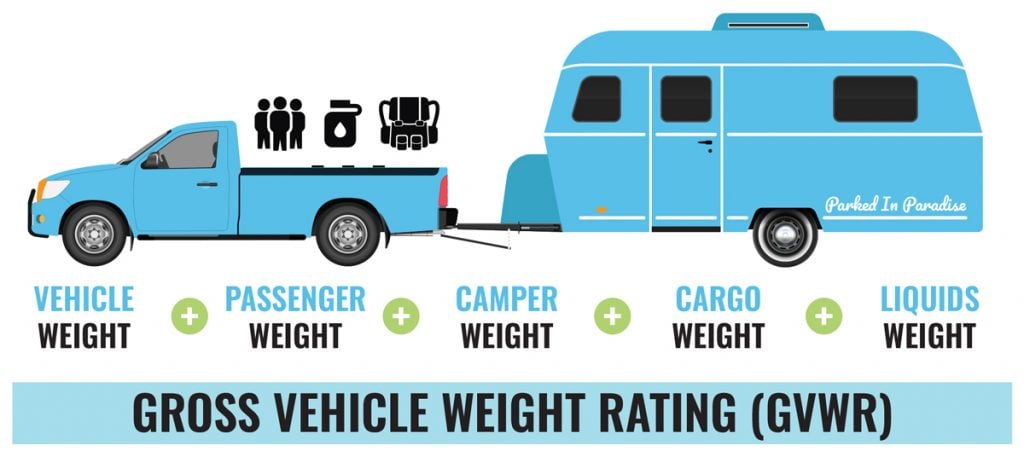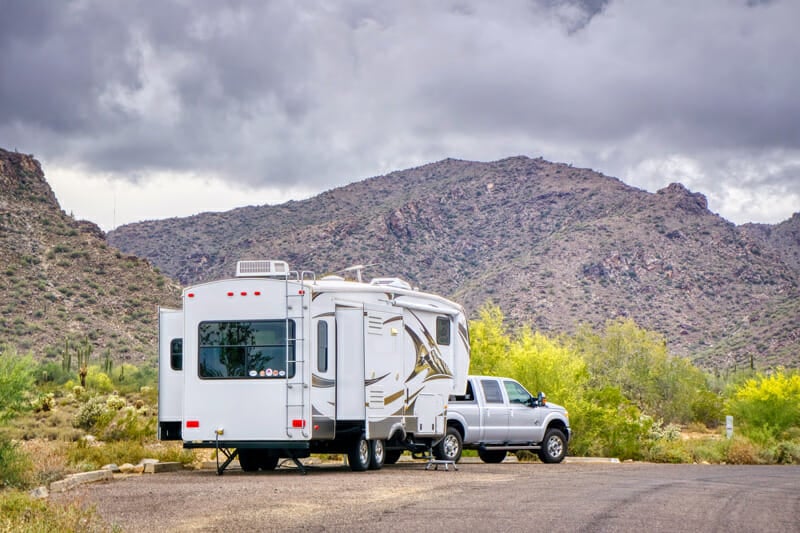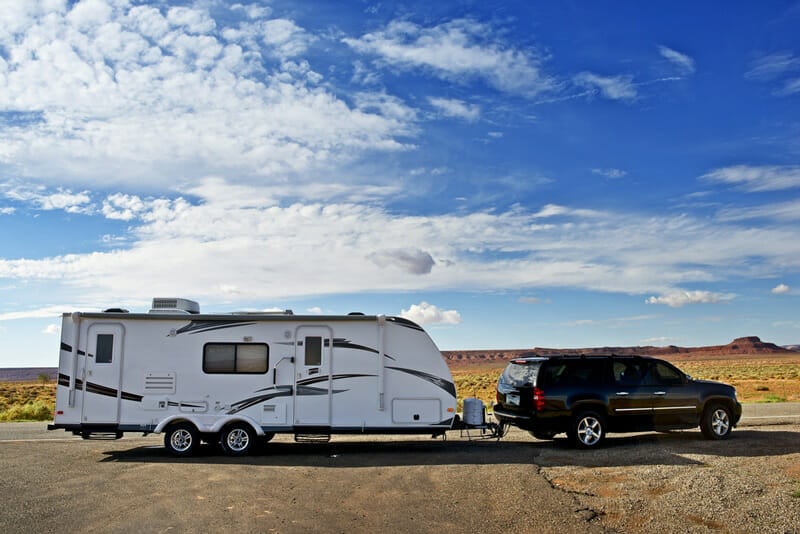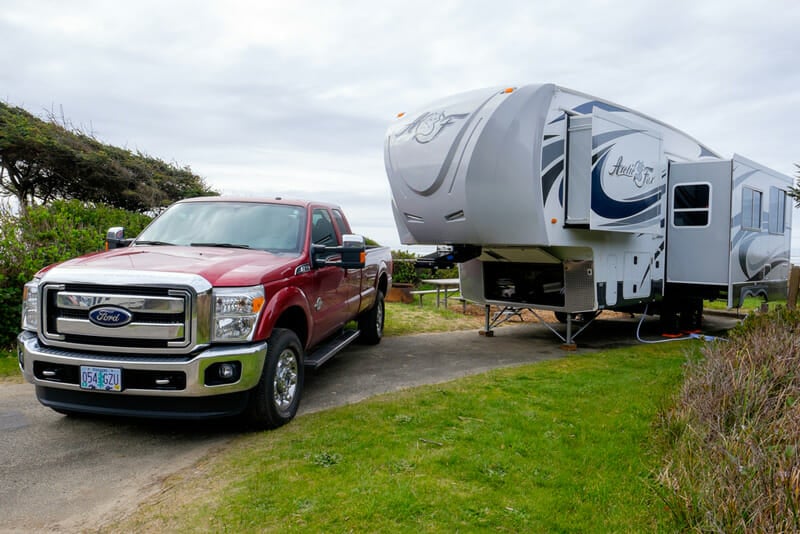GVWR Meaning – What is Gross Vehicle Weight Rating
When shopping for an RV, you may hear terms like GVWR, UVW, GCCC, etc. Fortunately for you, we’re here to clear the air and decipher these phrases, allowing you to have a stress-free buying experience and confidently acquire a suitable RV.
When buying a travel trailer, knowing the GVWR is crucial. You’ll want to be sure it can carry everything.
And knowing the GVWR weight will tell you if your vehicle has enough towing capacity for your trailer.

GVWR (Gross Vehicle Weight Rating) for Travel Trailers
When looking at travel trailer specifications, you should see a long list of numbers. The phrase GVWR is an important one to look for.
In the RV world, this term is well-known. But for the first-timer, deciphering the phrase can be a challenge.
The Gross Vehicle Weight Rating is abbreviated as GVWR.
When you see those letters, it signifies that this is the absolute maximum loaded weight that the trailer can carry when everything is loaded on. This is also known as the maximum loaded trailer weight, but it is the same as the GVWR.
This includes all of the water you’ll need for the trip and all of the passengers, toys, cargo, and optional gear.

It’s important to note that any additional weight added to the trailer or the vehicle towing the trailer might be harmful the trailer or the vehicle towing it.
Your vehicle has a GCWR, or Gross Combined Weight Rating, in addition to the GVWR. Your GCWR takes into account the weight of your vehicle and the weight of your trailer to determine the maximum combined weight that can be safely pulled.
Why is the GVWR Important for Safety?
The manufacturer sets the GVWR for a reason, and that purpose is safety. They determine the maximum vehicle weight of your trailer separately. As a result, it’s a good idea to stick to the GVWR.
The excessive weight of your vehicle can have various consequences and concerns. They are as follows:
- The brakes on the vehicle carrying the trailer are insufficient to halt or slow it down.
- Tires that are more prone to blowouts.
- The suspension may break under pressure.
- Can wreak havoc on the towing vehicle (too much weight on the hitch)
- It will be more challenging to steer, and a tip-over may occur.
- Front tire traction may be limited.
- The engine can overheat.
- Reduces the life of the truck’s transmission.
The GVWR is there for a reason. It isn’t lowballed to entice you to buy a larger trailer or irritate you. Going over the weight limit is extremely risky for your passengers and other drivers on the road.
Another reason to stick to your travel trailer’s GVWR is to ensure that your towing car and trailer endure as long as possible.
Pushing both of them to their limits regularly will drastically reduce their longevity. The more weight you carry, the harder your vehicle has to work.

Why is the GVWR Important When Purchasing a Travel Trailer?
When choosing a trailer, the GTW or Gross Trailer Weight is an important factor to consider. You might be considering your truck’s towing capacity.
When you have a truck that can only tow 8,000 pounds, don’t mistake searching for an 8,000-pound trailer. When choosing a trailer, ensure sure the GVWR or gross vehicle weight rating (GVWR or GVW) does not exceed 8,000 pounds.
This is just an example, but beginners frequently make this error, which may be costly. But, the good news is that having the GVWR mentioned is required by law so that you won’t make this error.
If you’re going to get a trailer, make sure you’ll be able to use it frequently without causing harm to it, your truck, or both.
Smaller travel trailers that can be towed by SUVs or other vehicles are available. Everything we’ve said so far also applies to these. Verify your towing capacity before you acquire a trailer or buy a new car.

Load Your Travel Trailer While Staying Under the GVWR Limit
Each trailer has a GVWR listed on it. This information can be found in the owner’s manual or by looking up the VIN.
Once you’ve determined the maximum weight you can carry, calculate how much you can bring.
The amount of weight you can have is derived by subtracting the trailer’s dry weight from the GVWR.
The weight of the water you are carrying is one of the first things to consider when packing your travel trailer. A gallon of water weighs a little over 8 pounds.
If you understand how much your tank carries, divide it by 8.3 to determine how much weight it holds. This will be around 300–500 lbs of your weight for larger travel trailers. This is a lot, but water is the most important things to have whether traveling or camping.
Food and clothing are also heavier than you may assume. Fill a box or two with your belongings and weigh them on a scale.
Don’t forget to account for the combined weight of all passengers.
Dishes, mattresses, gadgets, and routine cargo are other items that must be calculated. Everything adds up, and small things weigh more than they appear.
Remember this:
The most important thing to remember while filling your travel trailer is to load basics. You can go to a weigh station if you’re concerned about exceeding the GVWR.
Because trailers are meant to hold a lot, you should be fine if you aren’t overpacking. A weight distribution hitch is also helpful for safely distributing the weight of your camper.
Just remember to be cautious.
Check the GVWR before buying a trailer to be sure you can live within its constraints. This will keep everyone safe and allow your travel trailer to last as long as possible.
Additional Info:
Is towing capacity the same as GVWR?
The maximum weight that a trailer can carry when completely loaded with everything, including cargo and fluids, is referred to as the GVWR. Calculating towing capacity is more concerned with the towing vehicle. The greatest weight of your tow vehicle is referred to as towing capability.
What is a travel trailer’s dry weight?
The dry weight of a trailer is the trailer’s weight without any additional weight. The weight refers to how much a new trailer weighs before it is put to work. Using the dry weight and GVWR, one can estimate how much payload or freight can be placed into a trailer.
What is curb weight?
The curb weight of your vehicle is its weight with a full tank of gas but no passengers or cargo. To calculate towing capacity subtract the curb weight and payload of a vehicle from its GCVWR.
What is tongue weight?
The tongue weight is the downward force exerted on the hitch of a trailer by the trailer coupler. The standard distribution is 10-15% of the GVWR for a travel trailer. For example, if your travel trailer has a GVWR of 6,000 lbs, its tongue weight would be 600-900 lbs.
Final Thoughts
That’s all there is to it. The weight of your RV, all of your cargo, and your load should all be within the manufacturer’s safe limitations.
If you follow those rules, your trip will be safer, and you will avoid avoidable road risks! If you’re interested in more RV guides, check them out here.

This Post Has 0 Comments